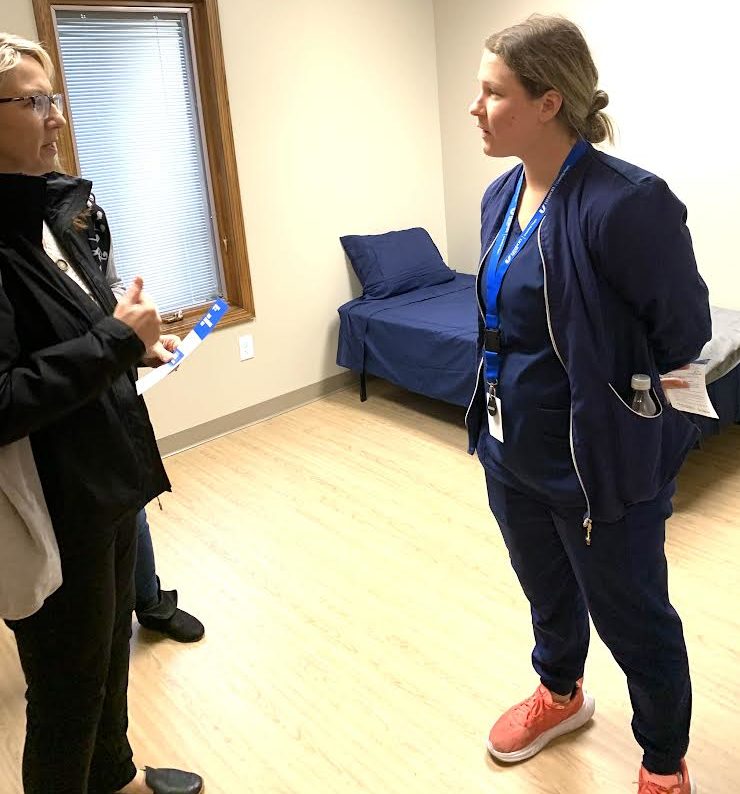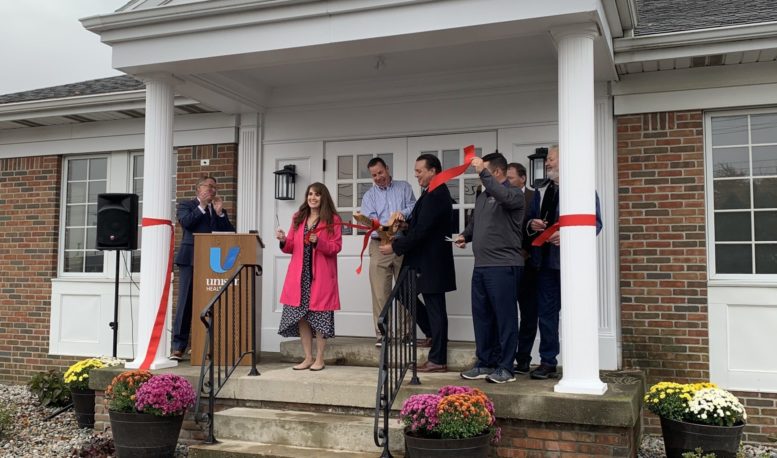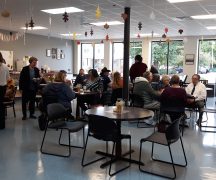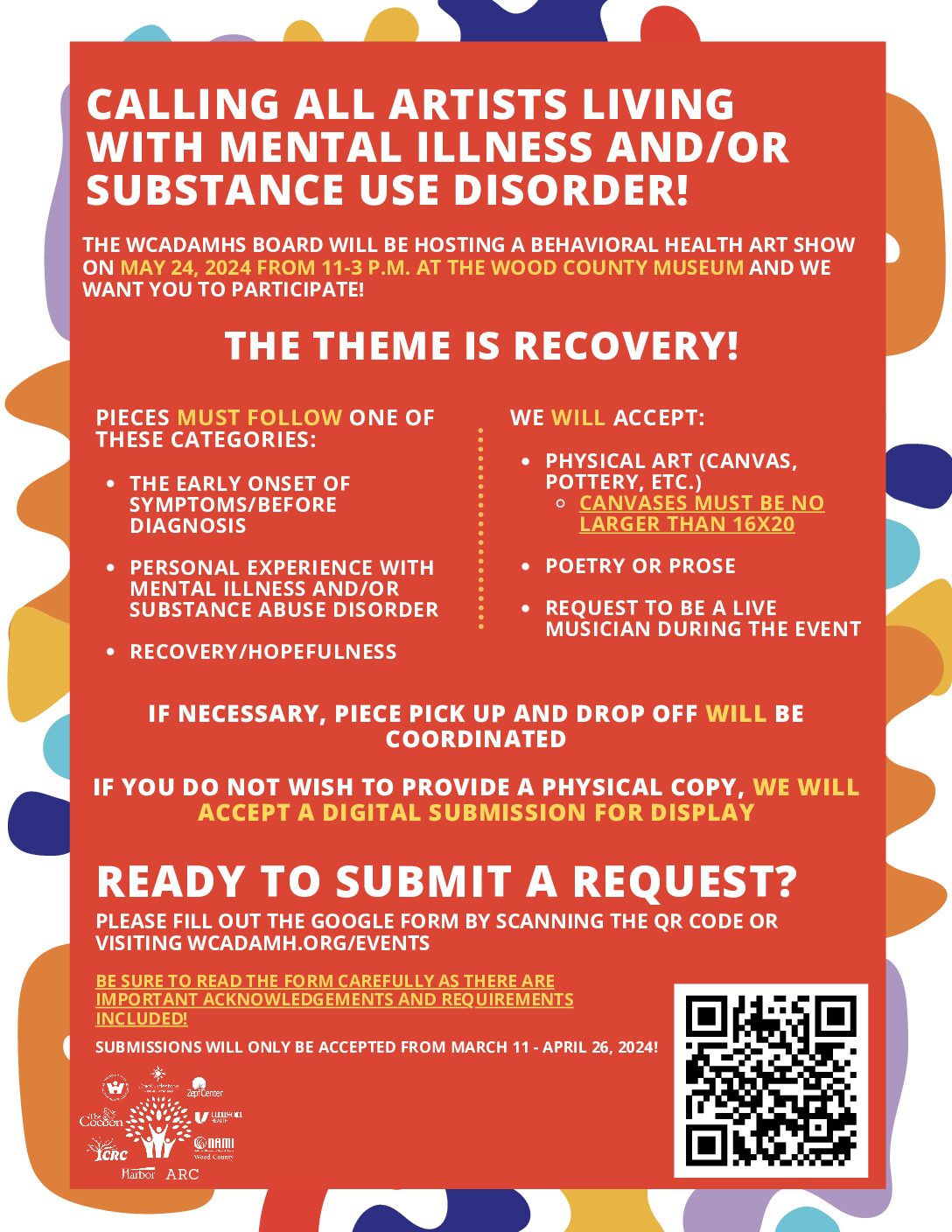By JULIE CARLE
BG Independent News
Individuals who are in a mental health crisis in Wood County now have a new option for care.
Unison Health has established a new Crisis Stabilization Unit in Bowling Green that could keep people out of the hospital or jail.
The new 12-bed, voluntary treatment center on West Poe Road is the first of its kind in Wood County to provide additional support services and treatment for those dealing with mental health crises. The new facility, which fills a huge gap in mental health care, was introduced to the community Wednesday morning during a ribbon-cutting ceremony.
“A behavioral health crisis can occur regardless of age, race, income or gender. On any given day, half of the individuals screened by a Unison Mobile Crisis Team will need hospitalization.
Many of those individuals will now be able to access that service here in the community and avoid transportation to and the challenges of being hospitalized in Toledo,” said Jeff DeLay, chief executive officer at Unison Health, a leading provider of mental health and substance abuse disorders treatment in Northwest Ohio.
Because the crisis stabilization unit is a voluntary treatment center, individuals will not have to give up their rights, which often happens if they are taken to an inpatient psychiatric service in Ohio. They will be able to stay up to 14 days, though the average stay will likely be between five and seven days.
“It’s not uncommon for individuals in a mental health crisis to sit in an emergency room for hours or days waiting for hospital inpatient beds to be available. And often law enforcement has no choice but to incarcerate someone in a mental health crisis when inpatient beds are not available” DeLay said.
“But I say—no more. Once the center is fully operational (within about a month), they will be able to take admissions 24 hours a day, seven days a week. We will continue to work with law enforcement to support treatment over incarceration,” he said.
Unison’s crisis stabilization team will work directly with the Wood County Mobile Crisis Team to provide the necessary services. The mobile crisis team is dispatched whenever behavioral health issues are called in to 911 or the county’s crisis line. Within an hour, the team will be on site to assess the individuals to determine the best and safest next steps. A team of therapists, behavioral health case managers, nurses and other clinical professionals work together to ensure a continuum of care.

Jodie Chappuis, Bowling Green team leader for the Assertive Community Treatment program, is excited to provide comprehensive services to local residents. She oversees the team that helps clients receive the services they need, whether it is therapy, prescriptions, appointments, clothing or housing.
DeLay thanked all the local, county and state governmental leaders and city workers who made the process go quickly and efficiently.
“We all know, and it’s been well documented, that the need is great,” said Bowling Green Mayor Mike Aspacher. “It says a lot about the Bowling Green and greater Wood County community that we were able to get this project up and running in the time frame we did – thank you to everyone with Unison Health for bringing this much-needed service. It speaks volumes how we in BG, the county and the state work together, roll up our sleeves when we see a need. We come together, determine what we can do to help to address these needs. We stand ready to support your mission in any way we are able.”
“This building is the product of efforts across our entire community – our law enforcement, our hospitals our government leaders, our local ADAMHS board and staff and most importantly our mental health and substance abuse providers,” said Daniel Lambert, a member and former chair of the Wood County Alcohol, Drug Abuse and Mental Health Services Board.
“When we asked our community where we were being challenged, it was in crisis response. When our neighbors need help, we needed a better option in our community to help them. When we looked at who in our community could take on this challenge, Jeff DeLay raised his hand,” Lambert said.
The board has had this type of service as the number one priority for many years, said current ADAMHS board chair Frank McLaughlin.
DeLay said, “The CSU isn’t the answer to all behavioral health crises. Some individuals will still need to be treated at the hospital, but this provides another tool in the community that allows people to be treated in their community.”
“You never know when that phone is going to ring, and someone is in crisis. This is a local touchpoint that has the organic capabilities of providing that treatment immediately,” said Ohio Rep. Haraz Ghanbari. “I want to commend all of you for your investment and willingness to answer a call greater than your own.”





